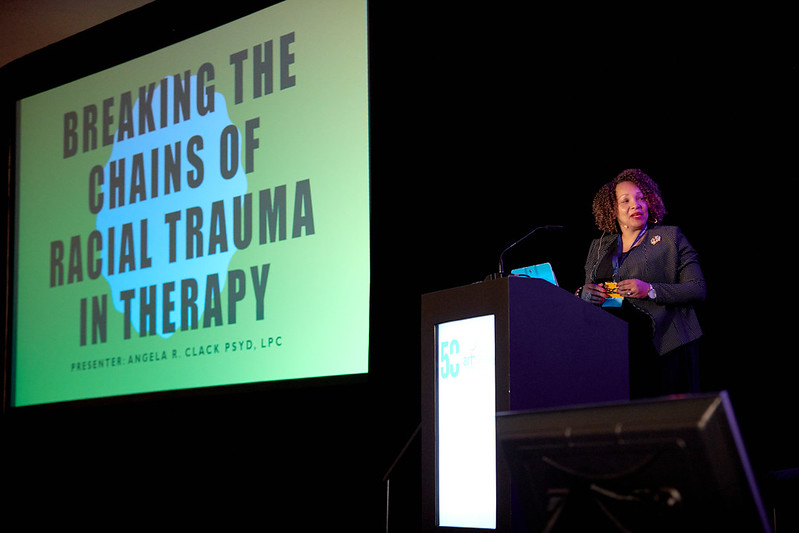February 25, 2020 | Angela Roman Clack, PhD, LPC
This post is part of the “Breaking the Chains of Racial Trauma in Therapy” blog series in honor of Black History Month, 2020.
I am pleased to participate in this blog series reemphasizing the themes covered in the “Breaking the Chains of Racial Trauma in Therapy” panel at the AATA’s 50th conference in Kansas City. In the panel presentation, I shared examples from my work with Black women to demonstrate how racism contributes to a denial of one’s psychological stress or acknowledgement of how therapy could be beneficial. It’s important to include social justice conditions in this conversation, so I began with the following thought:
Trauma Informed therapy is important, but Social Justice Informed Therapy is even more important. One cannot truly do trauma-informed therapy without understanding the trauma of Social Injustice.
Living life in black skin is an undeniable racialized existence. Stereotypes, implicit bias, oppression, cultural incompetency, and stigma, contribute to why African American women with mental health issues are the least likely to seek support and/or treatment, and if they do, they are less likely to receive services that align with their worldviews.

Dr. Angela Roman Clack presenting on the “Breaking the Chains of Racial Trauma in Therapy” panel plenary at the AATA’s 50th conference in Kansas City, MO.
Research statistics and reports show that Black women disproportionately suffer complications of pregnancy and childbirth; experience violence at home, at school, on the job and in the neighborhoods; are affected by HIV & AIDS; experience the highest rates of homicide of any racial group in the US; and are paid 38 percent less than white men and 21 percent less than white women. Further, Black girls in grades K-12 are 7 times more likely to be suspended from school and 4 times more likely to be arrested on school campus, and physical/medical disparities are disproportionately higher. Black girls experience higher incidences or mortality rates for various health condition such as heart disease, breast and cervical cancer, stroke, and more.
Here are three takeaways for therapists from my presentation:
1. Understand that racial bias transcends money and black privilege
Take for example the experience of Tennis Superstar Serena Williams, who has financial wealth and means and yet suffered a life-threatening experience after giving birth to her daughter. According to the CDC, Black women in the US are over 3 times more likely to die from pregnancy or child related causes. Serena’s experience validated observations and findings that Black women are often dismissed or ignored by medical care providers. This increases the concern of trust between white providers and Black patients.
A 2016 study published in the Journal of Health and Social Behavior assessed racial bias in therapy. The study confirmed that “racially distinctive names” and “race- and class-based speech patterns” resulted in significantly fewer call backs to come in for therapy. Very few therapists offered the “caller/actor LaToya Johnson” an appointment; yet “caller/actor Amy Roberts” received more invitations to come in and talk.
2. Address cultural suspicions about therapy
Help seeking influencers and barriers to women of color include healthy cultural suspicion/paranoia, the notion that therapy is often viewed as “anti-spiritual,” and the belief that therapy is only for “sick” or “crazy” people or white people with privilege. Mental health professionals need to work towards depathologizing symptom expression of minority and decolonized groups of people.
3. Build trust and openness as core to the therapeutic relationship
Regarding the therapist’s use of self in the relationship with the Black client, it is important to establish trust, openness, and curiosity. It is also important to take time to join with each member of the family ultimately with the goal of building a therapeutic rapport and clinical relationship that feels “real” and authentic. I challenge therapists to be open, be curious and be willing to consider and shift their perspective based on this new knowledge.
To help Black women begin the healing process that is often compounded and complicated by histories of racism, sexism and social injustices and mistreatment, we need to help women of color shift their attitudes toward mental health and to do our own work as well: identify blindspots (a critical self-examination), identify biases (we all have these), be curious about your impact on the other in the room and be willing to lean into difficult conversations, and to focus on “being” more than “doing” in the room (healing spaces).
Angela Roman Clack, PhD, LPC
Dr. Clack is a licensed psychotherapist, doctorally-trained clinician and owner of Clack Associates, LLC, a private practice outpatient counseling agency in Southern New Jersey. She has been working in the mental health field for more than 25 years. Dr. Clack earned her doctorate in 2002 with a degree in Clinical Psychology from Argosy University, Washington, D.C. Dr. Clack is known for her ability to teach, supervise, coach, and provide training in various areas pertaining to children, youth, and their families. Because of her training and teaching abilities, Dr. Clack has made a massive impact in her community by reducing the stigma of people of color who seek mental health treatment.

